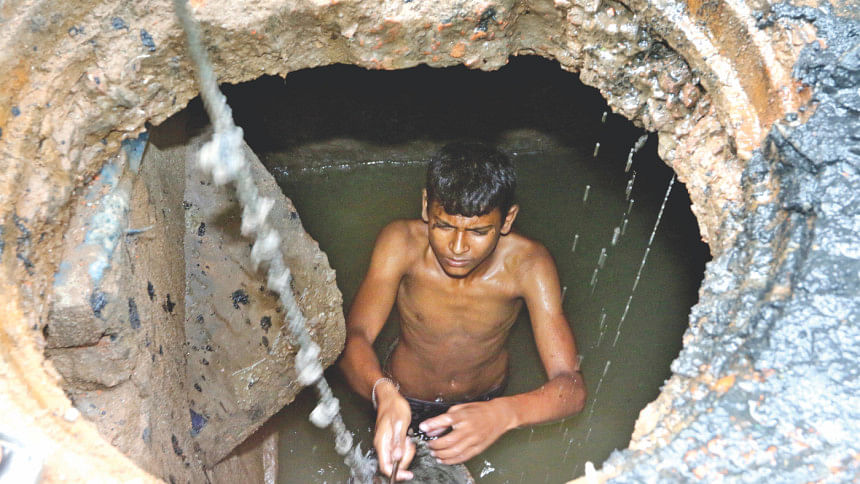Caught in cycle of miseries

While Bangladesh has made good progress in the sanitation sector, sanitation workers are still leading a dehumanising life, as most of them have to work manually and without safety gears.
The status of the sanitation workers was portrayed in a global report published that said low income, financial stress, informality and social stigma were part of the poor situation.
“They [sanitation workers] have not seen progress in their livelihoods, as shown by the lack of access to physical, financial, social, and human capital. They face discrimination when seeking loans or alternative occupations. Many times, their children do not approve of their parents’ occupation, which is another reason for them to contemplate alternative livelihoods,” said the report, titled “Health, Safety and Dignity of Sanitation Workers -- An Initial Assessment”.
The report, published last week by the World Health Organisation (WHO), said both in Bangladesh and India sanitation work is perceived to belong to the Dalit caste.
This stigma compounds the social ostracising and limitations on social mobility that workers face and often results in intergenerational discrimination, where children of sanitation workers often struggle to escape the vicious cycle of limited opportunities and sanitation work, it said.
The most undesirable and high-risk jobs are typically subcontracted to temporary, informal workers despite a substantial formal and permanent sanitation workforce being present in Bangladesh, with basic working conditions protected by law, the report highlighted.
“Furthermore, alcoholism and drug addiction to evade the working conditions are common among some sanitation workers,” it said.
It also said several case examples found reports of sanitation workers maintaining a low profile and hiding their occupation from their communities to protect their families’ safety and well-being.
The report, which was jointly authored by the International Labour Organization, WaterAid, World Bank, and WHO, features the plight and dehumanising working conditions of sanitation workers across nine lower and middle-income group countries -- India, Bangladesh, Bolivia, Burkina Faso, Haiti, Kenya, Senegal, South Africa, and Uganda.
While talking to Bangladesh Horijon Oikya Parishad, it was found that dozens of sewer cleaners in Bangladesh die every year as they dive into pools of human waste without any safety equipment. They use a stick or just their bare hands to clear blockages or septic tanks.
Members of the Parishad said the cleaners hold their breaths when they dive through human waste and must deal with poisonous fumes emitted by the sewage. The sewerage lines are acidic and poisonous due to rotten filth. Most of the time, they buy and drink some local liquor before starting work in the sewer.
Nirmal Chandra Das, general secretary of the Parishad, said the cleaners do not have any land of their own and are not even able to rent homes for themselves. They live in “colonies”, which are in terrible states, scattered across the city. Recently, there was an attempt by some quarters to evict the workers from one of the colonies in Old Dhaka.
“Discrimination [against them] is increasing by the day,” he said.
Around 15 lakh people from the Horijon community are in Bangladesh and most of them are employed in this profession.
They said the job is basically “inherited” from their forefathers and they have no other work skills which compels them to remain in this profession.
The report said sanitation workers across the developing world often suffer because of weak legal protection and a lack of enforcement of existing rules.
The numerous operational activities along the sanitation chain -- emptying and conveying faecal sludge, sewer maintenance, treatment, and end use/disposal -- have often been invisible or at least disregarded in regulatory frameworks, it emphasised.
“Though it is said to be a formal job, it is still dominated by the people who are not involved in any formal job. Still, they work as a day-labourers and as they are out of any formal sector, they are deprived of basic rights that are ensured by labour laws. The dangerous part is that the workers in this sector still work without any safety equipment,” Riad Arif, communication officer of OSHE, told The Daily Star.
The report said sanitation workers who are not protected by adequate health and safety measures risk injury, infection, disease, mental health issues, and even death.
The reported physical and medical conditions directly associated with sanitation work include headaches, dizziness, fever, fatigue, asthma, gastroenteritis, cholera, typhoid, hepatitis, polio, cryptosporidiosis, schistosomiasis, eye and skin burn and other skin irritation, musculoskeletal disorders (including back pain), puncture wounds and cuts, blunt force, and trauma.
According to the WHO/Unicef (2019) Progress report on household drinking water, sanitation and hygiene 2000-2017, an estimated 85.6 million people in Bangladesh do not have a decent toilet of their own.
It also said since 2000, the number of people with a decent toilet have increased by 131 percent.
The report said significant progress has been made since 2000 in ending open defecation, but only 48 percent of the population have access to basic sanitation.

 For all latest news, follow The Daily Star's Google News channel.
For all latest news, follow The Daily Star's Google News channel. 



Comments